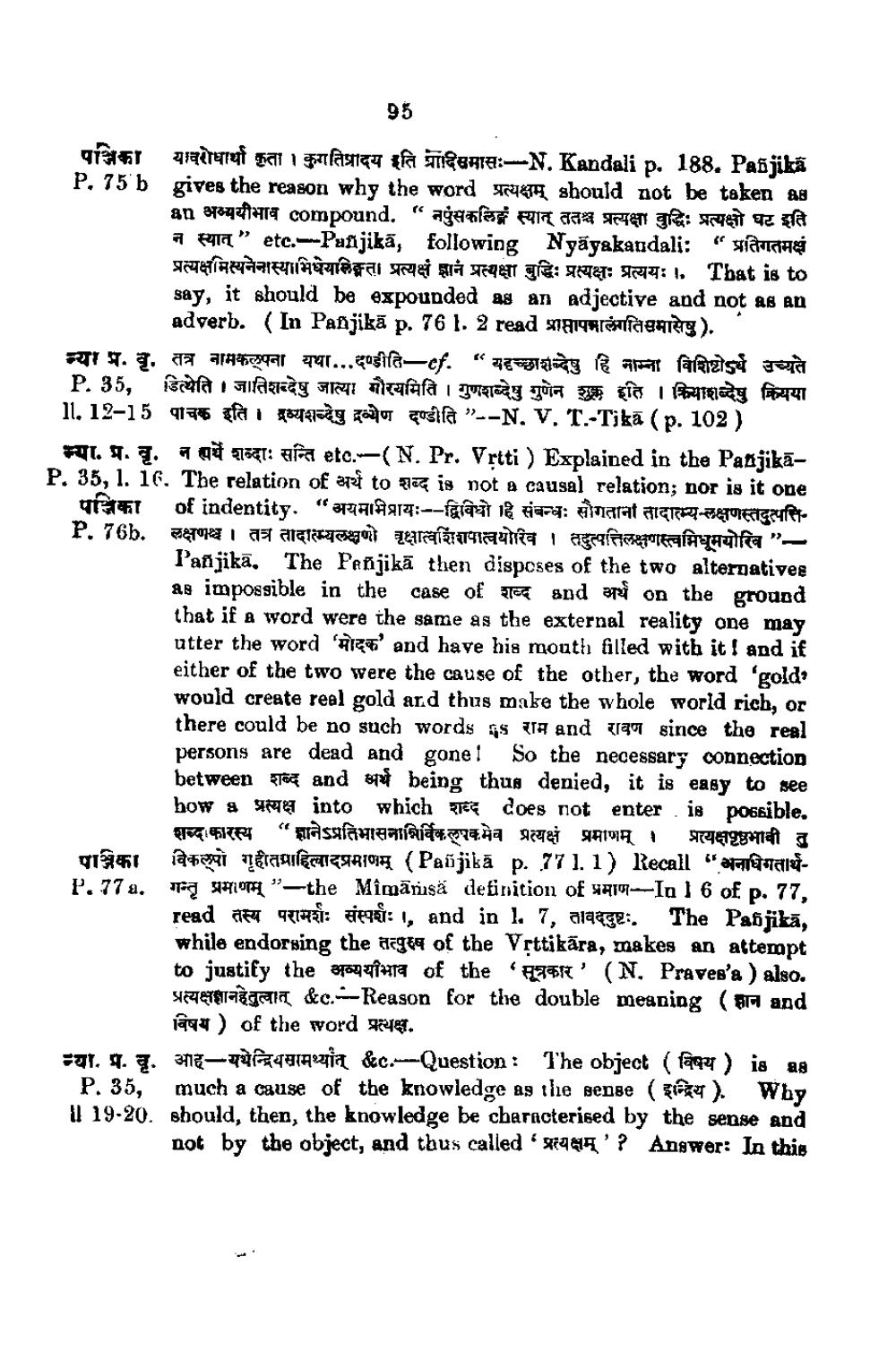________________
95
पत्रिका यावरोधार्थी कृता । कुगतिप्रादय इति प्रादिसमास:-N. Kandali p. 188. Paijiki P. 75'b gives the reason why the word 94489 should not be taken as
an अव्ययीभाव compound. “ नपुंसकलिङ्गं स्यात् ततश्च प्रत्यक्षा बुद्धिः प्रत्यक्षो घट इति न स्यात् " ete-Panjika, following Nyayakandali: "प्रतिगतमक्षं प्रत्यक्षमिस्यनेनास्याभिधेयलिङ्गता प्रत्यक्षं ज्ञान प्रत्यक्षा बुद्धिः प्रत्यक्षः प्रत्ययः। That is to say, it should be expounded as an adjective and not as an
adverb. ( In Panjika p. 76 1. 2 read प्राप्तापमालंगतिसमासेषु). न्या प्र. वृ. तत्र नामकल्पना यथा...दण्डीति-ef. “ यदृच्छाशब्देषु हि नाम्ना विशिष्टोऽर्थ उच्यते
P. 35, डित्येति । जातिशब्देषु जात्या गौरयमिति । गुणशब्देषु गुणेन शुक्ल इति । क्रियाशब्देषु क्रियया 11. 12-15 पाचक इति । द्रव्यशब्देषु द्रव्येण दण्डीति "--N. V. T.-Tika (p. 102)
भ्या. प्र. वृ. न बर्थे शब्दाः सन्ति etc.--(N. Pr. Vrtti) Explained in the PanjikaP. 35, 1. 16. The relation of art to page is not a causal relation; nor is it one
पत्रिका of indentity. “अयमाभप्रायः--द्विविधो हि संबन्धः सौगताना तादात्म्य-लक्षणस्तदुत्पतिP. 76b. लक्षणश्च । तत्र तादात्म्यलक्षणो वृक्षावशिंशपात्वयोरिव । तदुत्पत्तिलक्षणस्त्वमिधूमयोखि"
Panjikā, The Peñjikā then disposes of the two alternatives as impossible in the case of tea and ap on the ground that if a word were the same as the external reality one may utter the word 'hit' and have his mouth filled with it I and if either of the two were the cause of the other, the word 'gold: would create real gold and thus make the whole world rich, or there could be no such words as TA and 29 since the real persons are dead and gone! So the necessary connection between th and spare being thus denied, it is easy to see how प्रत्यक्ष into which शब्द does not enter . is possible.
शब्दाकारस्य “ज्ञानेऽप्रतिभासनानिर्विकल्पकमेव प्रत्यक्ष प्रमाणम् । प्रत्यक्षश्ठभावी तु पात्रका विकल्पो गृहीतग्राहिलादप्रमाणम् (Paijika p. 771. 1) Recall "अनधिगतार्थP.77. गन्तृ प्रमाणम् "-the Mimariusa definition of प्रमाण-In 1 6 of p. 77,
read तस्य परामर्शः संस्पर्शः ।, and in I. 7, तावददुष्टः. The Paijia, while endorsing the age of the Vrttikära, makes an attempt to justify the अव्ययीभाव of the 'सूत्रकार' (N. Praves'a) also. प्रत्यक्षानहेतुत्वात् &c..-Reason for the double meaning (ज्ञान and
विषय) of the word प्रत्यक्ष. न्या. प्र.व. आह-यथेन्द्रियसामथ्यात् &c.-Question : The object (विषय) is aa
P. 35, much a cause of the knowledge as the sense (इन्द्रिय). Why U 19-20. should, then, the knowledge be characterised by the sense and
not by the object, and thus called 'प्रत्यक्षम् ' ? Answer: In this




